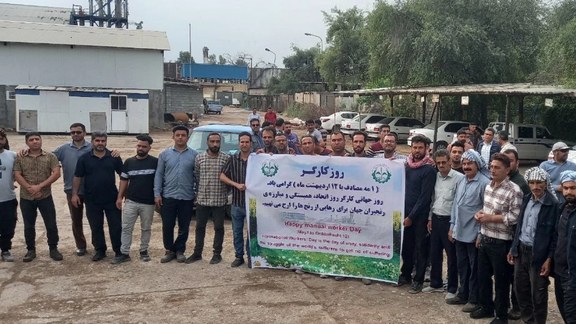May Day In Iran: Calls For 'Woman, Life, Freedom' Movement To Continue

Labor unions and teachers in Iran issued a joint statement on International Workers' Day, May 1st, urging the continuation of the "Woman, Life, Freedom" movement.

Labor unions and teachers in Iran issued a joint statement on International Workers' Day, May 1st, urging the continuation of the "Woman, Life, Freedom" movement.
‘Woman, Life, Freedom’ refers to the nationwide anti-regime protest that erupted in Iran following the death of Mahsa Jina Amini in the custody of the so-called morality police in 2022.
Experts have noted that the months-long protests presented the greatest challenge to the Islamic Republic since its inception 45 years ago. At least 550 protesters were murdered by the security forces during the demonstrations, including dozens of children.
Workers are among the groups that have been scrutinized more closely since the protests.
Criticizing the "religious rule" in the Islamic Republic, the statement noted: "The regime is based on a violent ideology that exploits and loots people to feed a market in which torture, blood, and death are normalized."
The statement further emphasized that the “only way to end this tyranny is to continue the Woman, Life, Freedom [movement]".
"We, teachers, workers, retirees, and oppressed people, believe a free world is possible through the will of free people," they added.
The Free Union of Iranian Workers, the Coordinating Council of Iranian Cultural Associations, and the Syndicate of Workers of Tehran and Suburbs Bus Company are among the signatories of this statement, which was released on the former's Telegram channel.
Despite Iran's constitution permitting the formation of independent trade union organizations, the Labor Law specifies certain organizations that workers are allowed to join, such as the Islamic Labor Council.
Thus, Iran has no labor organization in the conventional international sense. The existing unions, such as the ones signing the statement, face pressure and accusations for political and security reasons.
Still, workers and retirees from several industries, including Haft-Tappeh Sugarcane Complex, Construction Workers Association of Kamyaran, and Iran's Social Security Organization, rallied on May 1st to protest the government's lack of response to mounting demands.
The Iranian diaspora also joined the rallies in several cities, including Milan, Stockholm, Hamburg, and Paris, on this day, to represent the workers at home.
During the past few years, there has been a rise in the number of protests by workers in Iran, primarily due to monthly wages being refused and workers’ insurance claims being ignored. Some claimed that their salaries were not paid for the last 30 months.
By voicing their concerns, many workers have faced being targeted by authorities and imprisonment.
According to the Human Rights Activists News Agency (HRANA), at least 51 workers and labor activists have been detained during the last twelve months. The arrests include at least 32 miners in the two gold and stone mines of Agh-Darreh in August and several contractors of the South Pars oil and gas field located in Bushehr.
A sluggish economy and persistent inflation have substantially reduced the purchasing power of ordinary Iranians, causing tens of millions of Iranians to fall into the "working poor" category. According to experts, the poverty line for Tehran residents is approximately 300,000,000 rials (roughly $600) per month, three times the current minimum wage.